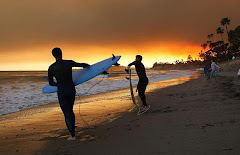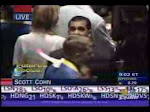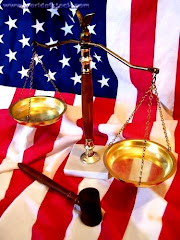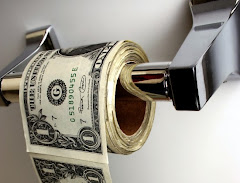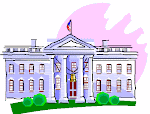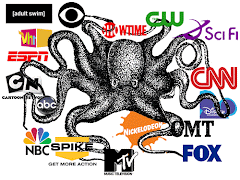Monday, June 25, 2007
Saturday, June 23, 2007
THE HILLARY CLINTON FELONY VIDEO !!!
he tape shows Clinton -- currently the leading Democratic presidential contender -- speaking in 2000 with Peter Paul, a Hollywood mogul, and comic book icon Stan Lee about a massive fundraising event for her 2000 Senate race. Paul spent about $2 million of his own money to produce the event. The legal contribution limit to a candidate then was $2,000.'
Labels:
2008 ELECTION,
CORRUPTION,
FELONY,
HILLARY CLINTON
Wednesday, June 20, 2007
Monday, June 18, 2007
Saturday, June 16, 2007
THE CHARACTERISTICS OF FASCISM
FOURTEEN CHARACTERISTICS OF FASCISM
Dr. Lawrence Britt, a political scientist, wrote an article about fascism which appeared in Free Inquiry magazine, a journal of humanist thought. Dr. Britt studied the fascist regimes of Hitler (Germany), Mussolini (Italy), Franco (Spain), Suharto (Indonesia), and Pinochet (Chile). He found the regimes all had 14 things in common, and he calls these the identifying characteristics of fascism. The article is titled "Fascism Anyone?," and appears in Free Inquiry’s Spring 2003 issue on page 20.
The 14 characteristics are:
1.. Powerful and Continuing Nationalism – Fascist regimes tend to make constant use of patriotic mottos, slogans, symbols, songs, and other paraphernalia. Flags are seen everywhere, as are flag symbols on clothing and in public displays.
2.. Disdain for the Recognition of Human Rights – Because of fear of enemies and the need for security, the people in fascist regimes are persuaded that human rights can be ignored in certain cases because of "need." The people tend to ‘look the other way’ of even approve of torture, summary executions, assassinations, long incarcerations of prisoners, etc.
3.. Identification of Enemies/Scapegoats as a Unifying Cause – The people are rallied into a unifying patriotic frenzy over the need to eliminate a perceived common threat or foe; racial, ethnic or religious minorities; liberals; communists; socialists; terrorists, etc.
4.. Supremacy of the Military – Even when there are widespread domestic problems, the military is given a disproportionate amount of government funding, and the domestic agenda is neglected. Soldiers and military service are glamorized.
5.. Rampant Sexism – The government if fascist nations tend to be almost exclusively male-dominated. Under fascist regimes, traditional gender roles are made more rigid. Opposition to abortion is high, as is homophobia and anti-gay legislation and national policy.
6.. Controlled Mass Media – Sometimes the media is directly controlled by the government, but in other cases, the media is indirectly controlled by government regulation, or through sympathetic media spokespeople and executives. Censorship, especially in wartime, is very common.
7.. Obsession with National Security – Fear is used as a motivation tool by the government over the masses.
8.. Religion and Government are Intertwined – Governments in fascist nations tend to use the most common religion in the nation as a tool to manipulate public opinion. Religious rhetoric and terminology is common from government leaders, even when the major tenets of the religion are diametrically opposed to the government’s policies or actions.
9.. Corporate Power is Protected – The industrial and business aristocracy of a fascist nation often are the ones who put the government leaders in power, creating a mutually beneficial business/government relationship and power elite.
10.. Labor Power is Suppressed – Because the organizing power of labor is the only real threat to a fascist government, labor unions are either eliminated entirely or are severely suppressed.
11.. Disdain for Intellectuals and the Arts – Fascist nations tend to promote and tolerate open hostility to higher education, and academia. It is not uncommon for professors and other academics to be censored or even arrested. Free expression in the arts is openly attacked, and governments often refuse to fund the arts.
12.. Obsession with Crime and Punishment – Under fascist regimes, the police are given almost limitless power to enforce laws. The people are often willing to overlook police abuses, and even forego civil liberties, in the name of patriotism. There is often a national police force with virtually unlimited power in fascist nations.
13.. Rampant Cronyism and Corruption – Fascist regimes almost always are governed by groups of friends and associates who appoint each other to government positions, and who use governmental power and authority to protect their friends from accountability.
14.. Fraudulent Elections – Sometimes elections in fascist nations are a complete sham. Other times elections are manipulated by smear campaigns against (or even the assassination of) the opposition candidates, the use of legislation to control voting numbers or political district boundaries, and the manipulation of the media. Fascist nations also typically use their judiciaries to manipulate or control elections.
Dr. Lawrence Britt, a political scientist, wrote an article about fascism which appeared in Free Inquiry magazine, a journal of humanist thought. Dr. Britt studied the fascist regimes of Hitler (Germany), Mussolini (Italy), Franco (Spain), Suharto (Indonesia), and Pinochet (Chile). He found the regimes all had 14 things in common, and he calls these the identifying characteristics of fascism. The article is titled "Fascism Anyone?," and appears in Free Inquiry’s Spring 2003 issue on page 20.
The 14 characteristics are:
1.. Powerful and Continuing Nationalism – Fascist regimes tend to make constant use of patriotic mottos, slogans, symbols, songs, and other paraphernalia. Flags are seen everywhere, as are flag symbols on clothing and in public displays.
2.. Disdain for the Recognition of Human Rights – Because of fear of enemies and the need for security, the people in fascist regimes are persuaded that human rights can be ignored in certain cases because of "need." The people tend to ‘look the other way’ of even approve of torture, summary executions, assassinations, long incarcerations of prisoners, etc.
3.. Identification of Enemies/Scapegoats as a Unifying Cause – The people are rallied into a unifying patriotic frenzy over the need to eliminate a perceived common threat or foe; racial, ethnic or religious minorities; liberals; communists; socialists; terrorists, etc.
4.. Supremacy of the Military – Even when there are widespread domestic problems, the military is given a disproportionate amount of government funding, and the domestic agenda is neglected. Soldiers and military service are glamorized.
5.. Rampant Sexism – The government if fascist nations tend to be almost exclusively male-dominated. Under fascist regimes, traditional gender roles are made more rigid. Opposition to abortion is high, as is homophobia and anti-gay legislation and national policy.
6.. Controlled Mass Media – Sometimes the media is directly controlled by the government, but in other cases, the media is indirectly controlled by government regulation, or through sympathetic media spokespeople and executives. Censorship, especially in wartime, is very common.
7.. Obsession with National Security – Fear is used as a motivation tool by the government over the masses.
8.. Religion and Government are Intertwined – Governments in fascist nations tend to use the most common religion in the nation as a tool to manipulate public opinion. Religious rhetoric and terminology is common from government leaders, even when the major tenets of the religion are diametrically opposed to the government’s policies or actions.
9.. Corporate Power is Protected – The industrial and business aristocracy of a fascist nation often are the ones who put the government leaders in power, creating a mutually beneficial business/government relationship and power elite.
10.. Labor Power is Suppressed – Because the organizing power of labor is the only real threat to a fascist government, labor unions are either eliminated entirely or are severely suppressed.
11.. Disdain for Intellectuals and the Arts – Fascist nations tend to promote and tolerate open hostility to higher education, and academia. It is not uncommon for professors and other academics to be censored or even arrested. Free expression in the arts is openly attacked, and governments often refuse to fund the arts.
12.. Obsession with Crime and Punishment – Under fascist regimes, the police are given almost limitless power to enforce laws. The people are often willing to overlook police abuses, and even forego civil liberties, in the name of patriotism. There is often a national police force with virtually unlimited power in fascist nations.
13.. Rampant Cronyism and Corruption – Fascist regimes almost always are governed by groups of friends and associates who appoint each other to government positions, and who use governmental power and authority to protect their friends from accountability.
14.. Fraudulent Elections – Sometimes elections in fascist nations are a complete sham. Other times elections are manipulated by smear campaigns against (or even the assassination of) the opposition candidates, the use of legislation to control voting numbers or political district boundaries, and the manipulation of the media. Fascist nations also typically use their judiciaries to manipulate or control elections.
Friday, June 15, 2007
BUSH AFRAID OF BLOGGERS ! ! !
WASHINGTON--The Bush administration on Thursday blasted a congressional proposal that would shield a broad swath of news gatherers, including some bloggers, from revealing their confidential sources.
The latest draft of the Free Flow of Information Act would pose a grave threat to national security and federal criminal investigations by protecting far too large a segment of the population, a U.S. Department of Justice official told Congress.
A correction was made to this story. Read below for details.
"The definition is just so broad that it really includes anyone who wants to post something to the Web," Rachel Brand, assistant attorney general in the Justice Department's Office of Legal Policy, said at a House Judiciary Committee hearing here. She also argued it would protect "a terrorist operative who videotaped a message from a terrorist leader threatening attacks on Americans."
Justice Department opposition has bedeviled Congress throughout its numerous attempts in recent years to enact federal shield laws. Supporters say such legislation is needed in light of high-profile cases involving New York Times reporter Judith Miller and what free-press advocacy groups characterize as a sharp rise in subpoenas to reporters in recent years.
Laws recognizing some form of "reporter's privilege" already exist in 49 states and the District of Columbia--but, crucially, do not shield journalists from federal prosecutors. The Bush Administration claims there's no evidence that source-related subpoenas to reporters are on the rise and argues that it already has robust internal guidelines, including a requirement that the attorney general personally approve such subpoenas and provide an appropriate balance between press freedom and investigative needs.
"I'd say anyone who didn't want to face legal action would immediately try to put up a blog and try to get journalistic protection."
--Rep. Brad Sherman (D-Calif.)
This year's Free Flow of Information Act, which has been introduced in both the House and Senate, proposes a protection for a broader swath of people than earlier versions. It covers anyone engaged in journalism, which is defined as "gathering, preparing, collecting, photographing, recording, writing, editing, reporting or publishing of news or information that concerns local, national or international events or other matters of public interest for dissemination to the public."
Even those covered individuals could be forced to give up their sources under certain circumstances, including when it's clear that crimes have been committed, when "imminent or actual harm" to national security could occur, or when trade secrets, nonpublic personal information or health records are compromised in violation of existing laws.
The hearing, which lasted about three hours, highlighted again the tensions that have arisen as the traditional mainstream media continues to overlap and collide with Internet-based upstarts.
On several occasions, politicians from both parties questioned whether the bill should be so expansive as to include bloggers. Some bristled at the notion that the ease of publishing online could provide cover for those who want to leak sensitive information and get away with it.
"I'd say anyone who didn't want to face legal action would immediately try to put up a blog and try to get journalistic protection," said Rep. Brad Sherman (D-Calif.), adding that he hoped to work with his colleagues to refine that definition.
But even one of the bill's opponents, George Washington University Law School professor Randall Eliason, said, "anything narrower is going to run into severe First Amendment problems."
William Safire, a longtime New York Times columnist and former Nixon administration speech writer, praised the bill's current definition because he said it focuses on the actions characteristic of journalists, not their affiliations.
"Whether you're a blogger or whether you're The New York Times or CBS or The Wall Street Journal, if what you are doing is aimed at informing the public, then you're a journalist, whether you get paid for it or not," he said. (The New York Times, the National Association of Broadcasters and other journalism groups have endorsed the latest bill, according to its sponsors.)
Now on News.com
FAQ: What to do with your Yahoo photos Coming attractions for history's first cyber-war Photos: Stanford passes first DARPA test Extra: Watch out for leaky 'rebate cards'
At Thursday's hearing, the bill's chief sponsors, Reps. Rick Boucher (D-Va.) and Mike Pence (R-Ind.), never directly addressed the issue of the journalist definition they crafted. Boucher told CNET News.com in an interview earlier this year that they intended to include bloggers "who are regularly involved in newsgathering and reporting." Any refinement of that definition would be left up to the courts.
Instead, the bill's sponsors continued to tout the necessity of passing their measure as soon as possible. The measure, Pence said, "is not about protecting reporters, it's about protecting the public's right to know."
Some Republicans said they opposed the bill more broadly because they believed it would give undue protection to anyone who publishes false or irresponsible information. Former Judiciary Committee chairman Jim Sensenbrenner (R-Wis.) cited a New York Times story last year about a government computer system to track money laundering by terrorists as an example of a situation in which a news outlet harmed American national security interests.
"I don't see very much responsibility there," he said. "It seems to me the burden of proof in showing a press shield will be used responsibly should be on the news media."
Correction: Due to an editing error, this story misstated the day of the week the Bush administration criticized a congressional proposal that could let bloggers protect sources in some cases. The day is Thursday.
The latest draft of the Free Flow of Information Act would pose a grave threat to national security and federal criminal investigations by protecting far too large a segment of the population, a U.S. Department of Justice official told Congress.
A correction was made to this story. Read below for details.
"The definition is just so broad that it really includes anyone who wants to post something to the Web," Rachel Brand, assistant attorney general in the Justice Department's Office of Legal Policy, said at a House Judiciary Committee hearing here. She also argued it would protect "a terrorist operative who videotaped a message from a terrorist leader threatening attacks on Americans."
Justice Department opposition has bedeviled Congress throughout its numerous attempts in recent years to enact federal shield laws. Supporters say such legislation is needed in light of high-profile cases involving New York Times reporter Judith Miller and what free-press advocacy groups characterize as a sharp rise in subpoenas to reporters in recent years.
Laws recognizing some form of "reporter's privilege" already exist in 49 states and the District of Columbia--but, crucially, do not shield journalists from federal prosecutors. The Bush Administration claims there's no evidence that source-related subpoenas to reporters are on the rise and argues that it already has robust internal guidelines, including a requirement that the attorney general personally approve such subpoenas and provide an appropriate balance between press freedom and investigative needs.
"I'd say anyone who didn't want to face legal action would immediately try to put up a blog and try to get journalistic protection."
--Rep. Brad Sherman (D-Calif.)
This year's Free Flow of Information Act, which has been introduced in both the House and Senate, proposes a protection for a broader swath of people than earlier versions. It covers anyone engaged in journalism, which is defined as "gathering, preparing, collecting, photographing, recording, writing, editing, reporting or publishing of news or information that concerns local, national or international events or other matters of public interest for dissemination to the public."
Even those covered individuals could be forced to give up their sources under certain circumstances, including when it's clear that crimes have been committed, when "imminent or actual harm" to national security could occur, or when trade secrets, nonpublic personal information or health records are compromised in violation of existing laws.
The hearing, which lasted about three hours, highlighted again the tensions that have arisen as the traditional mainstream media continues to overlap and collide with Internet-based upstarts.
On several occasions, politicians from both parties questioned whether the bill should be so expansive as to include bloggers. Some bristled at the notion that the ease of publishing online could provide cover for those who want to leak sensitive information and get away with it.
"I'd say anyone who didn't want to face legal action would immediately try to put up a blog and try to get journalistic protection," said Rep. Brad Sherman (D-Calif.), adding that he hoped to work with his colleagues to refine that definition.
But even one of the bill's opponents, George Washington University Law School professor Randall Eliason, said, "anything narrower is going to run into severe First Amendment problems."
William Safire, a longtime New York Times columnist and former Nixon administration speech writer, praised the bill's current definition because he said it focuses on the actions characteristic of journalists, not their affiliations.
"Whether you're a blogger or whether you're The New York Times or CBS or The Wall Street Journal, if what you are doing is aimed at informing the public, then you're a journalist, whether you get paid for it or not," he said. (The New York Times, the National Association of Broadcasters and other journalism groups have endorsed the latest bill, according to its sponsors.)
Now on News.com
FAQ: What to do with your Yahoo photos Coming attractions for history's first cyber-war Photos: Stanford passes first DARPA test Extra: Watch out for leaky 'rebate cards'
At Thursday's hearing, the bill's chief sponsors, Reps. Rick Boucher (D-Va.) and Mike Pence (R-Ind.), never directly addressed the issue of the journalist definition they crafted. Boucher told CNET News.com in an interview earlier this year that they intended to include bloggers "who are regularly involved in newsgathering and reporting." Any refinement of that definition would be left up to the courts.
Instead, the bill's sponsors continued to tout the necessity of passing their measure as soon as possible. The measure, Pence said, "is not about protecting reporters, it's about protecting the public's right to know."
Some Republicans said they opposed the bill more broadly because they believed it would give undue protection to anyone who publishes false or irresponsible information. Former Judiciary Committee chairman Jim Sensenbrenner (R-Wis.) cited a New York Times story last year about a government computer system to track money laundering by terrorists as an example of a situation in which a news outlet harmed American national security interests.
"I don't see very much responsibility there," he said. "It seems to me the burden of proof in showing a press shield will be used responsibly should be on the news media."
Correction: Due to an editing error, this story misstated the day of the week the Bush administration criticized a congressional proposal that could let bloggers protect sources in some cases. The day is Thursday.
Wednesday, June 13, 2007
Friday, June 8, 2007
GIULIANIS GOONS "ROUGH UP" REPORTER AT GOP
WHEN A REPORTER WITH FULL PRESS CREDENTIALS IS ARRESTED FOR ASKING TOUGH QUESTIONS AT THE GOP, IT IS MAJOR RED FLAG. GIULIANI IS NOT EVEN PRESIDENT CAN YOU IMAGINE "IF HE GETS ELECTED !!!
Labels:
2008 ELECTION,
ALEX JONES,
INFOWARS,
MATT LEBEK,
RUDY GIULIANI
Thursday, June 7, 2007
Wednesday, June 6, 2007
MIKE GRAVEL CONTINUES TO ROLL
MIKE GRAVEL ON CNN HE'S ANTI WAR,ANTI IRS AND PRO DRUGS !!!
I LOVE HOW HE ASKS RICK SANCHEZ FOR SOME MONEY !!!
HE SLAMS THE CANDIDATES ON GAS PRICES AND TAXATION
I LOVE HOW HE ASKS RICK SANCHEZ FOR SOME MONEY !!!
HE SLAMS THE CANDIDATES ON GAS PRICES AND TAXATION
Monday, June 4, 2007
STOPPING THE NWO- ONE POLICE VAN AT A TIME ?
G 8 SUMMIT PROTESTERS USING VIOLENCE TO STOP VIOLENCE IS NOT LOGICAL
Sunday, June 3, 2007
Saturday, June 2, 2007
Friday, June 1, 2007
Subscribe to:
Posts (Atom)
Popular Posts
-
Its a simple plan of creating dependence on government as an entitlement. The dependence becomes centralized control and entitlement becomes...
-
Click Here to submit your films Click Here to submit your films
-
Telementation is a variation of what is often called "The Law of Attraction", where telementation focuses more on feeling reali...
-
The first question we need to ask is "Where is all the oil' ? Why Would They Do This ? Massive Social Change and Depopulat...
-
Bigger than 911 in terms of the scope and magnitude of people it will effect! Similar to the past events there is a main stream version - th...
-
While others may view the stories about Warren G. Harding's black ancestry as rumor, Marsha Stewart sees it as fact. Mrs. Stewart, a 60-...
-
To its 117 elderly residents, Wesley Acres is simply a peaceful place to pass their twilight years. Only when viewed from above does it beco...
-
A recent study from the Congressional Budget Office (CBO) has zero credibility. It pegged likely taxpayer losses in the Fannie Mae and Fredd...
-
Economics 101- You cannot solve a debt crisis with more debt ! It's like you are with a friend at a casino, your friend loses all his mo...
-
Here's the skinny...The Human body does not require carbohydrates to perform any type of biological functions. The body will convert fat...
What is Mienfoks ?
Recent Posts
-
▼
2007
(244)
-
▼
June
(21)
- HISTORY OF FREEMASONARY BY FREEMAN
- THE HILLARY CLINTON FELONY VIDEO !!!
- RUDY GIULIANI CAMPAIGN CHAIRMAN BUSTED WITH COKE
- BUSH OFFICIALLY MAKING IT UP AS HE GOES !!!
- WOMEN GETS NO HELP IN EMERGENCY ROOM
- THE CHARACTERISTICS OF FASCISM
- BUSH AFRAID OF BLOGGERS ! ! !
- GORE SLAMS BUSH ON TERRORISM ( 1992 )
- RON PAUL - WHY THE GOP NEEDS CHANGE ?
- GIULIANIS GOONS "ROUGH UP" REPORTER AT GOP
- WHAT DOES GOD THINK OF RUDY'S CAMPAIGN ???
- RON PAUL REPUBLICAN DEBATE ON JUNE 5TH
- MIKE GRAVEL CONTINUES TO ROLL
- EX - SOLDIER TELLS THE REAL IRAQ STORY
- DEMOCRATIC ROGUES GALLERY
- STOPPING THE NWO- ONE POLICE VAN AT A TIME ?
- HUSTLERS LARRY FLYNT FOR PRESIDENT ! ! !
- PAT CONDELL - WHY SAUDI ARABIA ???
- THIS IS EXTREMELY ILLEGAL ! ! !
- TB CARRIER ELUDES HOMELAND SECURITY !
- MICHAEL "SICKO" MOORE TALKS WITH BILL MAHR
-
▼
June
(21)

- NilesLesh
- You can pretend to be serious; But you can't pretend to be funny.
